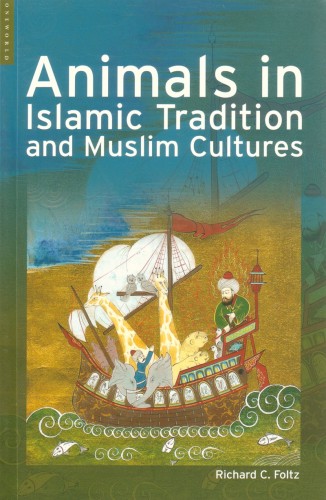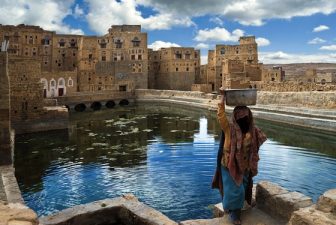 Arwa reviews the book by Richard C. Foltz, Animals in Islamic Tradition and Muslim Culture, Oneworld Publications
Arwa reviews the book by Richard C. Foltz, Animals in Islamic Tradition and Muslim Culture, Oneworld Publications
Following the controversy during Eid Al-adha and allegations of animal mistreatment in Egypt, I found myself questioning how my faith which teaches compassion towards animals could become so inextricably linked to clear animal abuses.
Islam, despite what many state, does teach compassion towards every single animal- even dogs and pigs which face so much stigma in the Muslim world. In an effort to educate myself more about my faith and arm myself with information against those who justify those abuses- I did what journalists do best. I did some research. I stumbled across Richard C Foltz’s book during my search and his book instantly won points by have a title which recognised the difference between Islamic teachings and Muslim culture. In fact, it turned out to be a little gem of a book and even had some interesting things to say about Islam and the environment!
Richard Foltz is Canadian-based historian whose specialises in Iran although has written about the link between Islam and ecology as well as animals rights and Islam. It seems that he was quite reluctant to write this book (the first line of the book is “This is a book I hoped someone else would write”) as he thought it would carry more weight coming from a religious scholar. I see his point but I am still really glad he went ahead anyway as he delivers is a pitch-perfect, treasure trove of information about Islam and its attitudes to animals.
At just under 200 pages, the book is quite an easy read and is neatly separated into 7 short chapters on topics as diverse as Islamic Vegetarianism, Muslim attitudes towards dogs as well as the complex and sometimes contradictory place of animals in Islamic literature, art, philosophy and science.
Rather than making the usual statements about the specifics of ritual slaughter and how Islam teaches compassion towards animals, Foltz delves deeper to consider the role of the Qur’an, hadiths, Muslim culture as well as contemporary Muslim animal rights advocates such as B.A. Masri.
Animals in Islamic Literature, Law and Poetry

Foltz begins by distinguishing between the influence of Arab culture, the role of hadiths and also the fact that the Islamic ethical system extends moral responsibility to non-human animals at a level which surpasses the Christian tradition and Western Enlightenment (which framed animals as soulless creatures whose sole function was to serve humans).
Despite this solid foundation to build on, Foltz explains that Islamic jurists have failed to genuinely connect with the issue or introduce new thought on animals rights. Contemporary issues such as animal rights, factory farming and species preservation barely get a look in and most jurist tend to receive questions only related to the intricacies of halal meat and what is permissible to eat.
The next two chapters focus on the place of animals in Islamic philosophy through history and literature. Foltz explores the case of a group of Iraqi radical Muslim philosophers who wrote a treatise during the 10th century called ‘The Case of the Animals versus Man before the King of the Jinn’.
In the book, representatives of the animal kingdom argue their case against the human race who they accuse of abusing the earth as well as the animals themselves.
Now, I’m not going to give away the verdict but it’s a fascinating critique of human attitudes towards animals in the Muslim world. Similarly, Foltz mines Sufi poetry for animal themes such as the famous poem ‘The Conference of the Birds’ which tells the story of the bird kingdom’s search for a mythical king which I explored more fully in a previous post on Sufi poetry and nature.
A Change On The Horizon?
Whilst highlighting the real potential within Islam to build on animals rights, the author is careful to distinguish between the existence of Islamic beliefs and their ability to translate into real action. In the fifth chapter which looks at contemporary Muslim attitudes on animal rights and chapter six which is dedicated to Islamic vegetarianism, Foltz is cautious to overstate the popularity of beliefs which focus on animal rights in the Muslim world.
Whilst acknowledging their existence, he states that these practices remain firmly outside the mainstream despite strong Islamic arguments for their adoption. Furthermore, the seventh chapter dedicated to the notorious negative treatment of dogs in the Muslim world is explored and although the argument behind the widespread notion that dogs are impure is challenged, Foltz admits that the predominant attitude remains one-sided and unchanged.
The final conclusion is particularly relevant as it puts the entire issue into context by focusing on the need to protect and preserve nature for the survival of the earth.
As Foltz states: “The earth is made up of not just one Muslim or human community but of many communities, all of them interdependent, all of them vital, all of them worthy of consideration and respect.” He also links a rise in environmental consciousnesses with improved animals rights as he argues that the more aware we are of our own dependence on non-human life forms, the more we are willing to protect earth’s complex ecosystems.
For more Green Book Reviews see:
Book Review: Loving Leo Hickman’s ‘The Good Life’
Living A Simpler, Deeper Life With ‘The Moneyless Man’
Interview With Locavore Expert Leda Meredith




Sounds really interesting reading; just added it to my ‘wish list’…. now to find the time to read it (especially when once I start a book I just have to immediately finish it). Thanks for sharing! In peace, Rianne